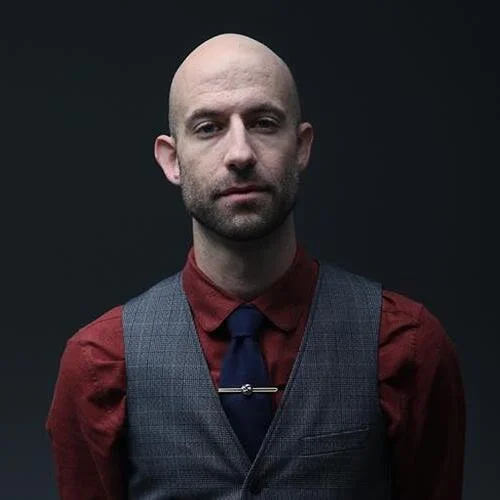Cecil Baldwin
photo by Noah Fecks
Cecil Baldwin is spending his apocalypse like many of us — sitting in his apartment, trying not to obssess over the news, taking long walks and eyeing the future. But he’s eyeing the future by looking to the past.
He may be the voice of the massively popular Welcome to Night Vale, icon to a passionate fandom as well as LGBTQ teens and adults the world over, a classically trained actor, Neo-Futurist and possessor of a voice that makes movie trailer narrators weep … but that doesn’t stop him from feeling a little adrift right now.
“Whatever this Zoom bandaid is, it’s like trying to put a bandaid on an amputated limb … we're trying to figure out what is the role of the artist in all this, and [that] involves completely rethinking form.”
“I think for the first two weeks of the pandemic I think I went through a mourning period,” Baldwin says. Welcome to Night Vale was scheduled for tours of North America and Europe, he had been accepted to the SITI Company’s summer intensive training program and he had a year of employment lined up. Then much of it vanished.
He and the Night Vale crew had just begun their first tour when the pandemic hit the U.S., and there was a scramble to get performers and crew back home before travel restrictions went into effect.
“Once that settled down, then it was a good two weeks of … it was like after 9/11, where you would just kind of wander from room to room and look at your hands, wander to another room and make a pot of tea and then forget what you made, and then kind of wander away. I couldn't focus on anything.”
In an effort to come to terms with the constantly changing new world, Cecil began to reevaluate the shape and role of theatre and podcasting in pandemic.
“Whatever this Zoom bandaid is, it’s like trying to put a bandaid on an amputated limb,” he says. “We're trying to figure out what is the role of the artist in all this, and unfortunately [that] involves completely rethinking form. When we don't have the natural ability to be in a room with somebody and to hear a piece of music, or to see a dance or to watch two actors engage in a scene. How do we capture that?”
He took on a new self-produced project, tackling Homer’s The Odyssey in weekly podcast installments. Cecil explains, “this story for whatever reason has resonated with me because I'm stuck in my Brooklyn apartment and, you know, in a lot of ways I feel like I am adrift at sea in a tiny little boat in the middle of Brooklyn, and I know there's people out there, and I know there's a world beyond my apartment, but I can't quite reach them.”
The podcast, which he intends to launch this summer, is built to apply the oldest form of storytelling to today’s needs. Each week’s segment will include a reading from The Odyssey accompanied by personal reflections. “The term I'm using right now is the digital campfire,” he says. “Which to me is this perfect marriage of technology and ephemerality — you have to show up.”
Although tours may be postponed, Baldwin’s work with Welcome to Night Vale continues apace. He credits the podcast, along with his work with the New York Neo-Futurists, with giving him the freedom to shake off the weird, minimizing expectations of the commercial acting business and to embrace the role of… being himself.
“I just got a little bit tired of interacting with people … who would say, ‘you just need to be yourself, but just not quite yourself. You need to be a more commercially viable version of yourself,’” he explains. “I found myself getting so close to breaking through to network TV, to breaking through to the independent film scene, to breaking through to commercial theater, the sort of big budget commercial theaters, but I just never quite was there. I found that I would rather be myself and say, ‘fuck you, if you don't want this, then you can go cast somebody else.’ And sure enough, they did.”
Welcome to Night Vale offered an opportunity to work without stultifying commercial expectations. “That was one of the great gifts that Night Vale gave me,” Baldwin says. “It allowed me to be a little more crazy, a little more unique to make choices that are truly my own. And those are the ones that people kind of held on to.”
As we navigate the uncertain waters of a new “normal,” Baldwin finds comfort and hope in embracing the present moment and using it to forge the work of the future. “The old forms, just don't cut it anymore,” He says. “We need new forms. And so now is the time to reinvent or to augment yourself as an artist and go ‘yes, I know you love what I did five years ago, but now go with me. Go with me on this. It is not five years ago. We are right now, and therefore we must make things related to right now.’”
He recalls a landmark journey, hiking Mt. Kilimanjaro, as a key revelation to valuing the joy of the present moment. “The thing that I learned from hiking Kilimanjaro is that it is not about how fast you do it … we would take our breaks, you know, kind of like little snack breaks and things like that. And every single time I would put on disco music, and and I called them disco breaks. And the people on the road, on the trail would look at me like I was crazy. But for me, it was more about enjoying it. And I was like, why not dance your way through this experience?”










